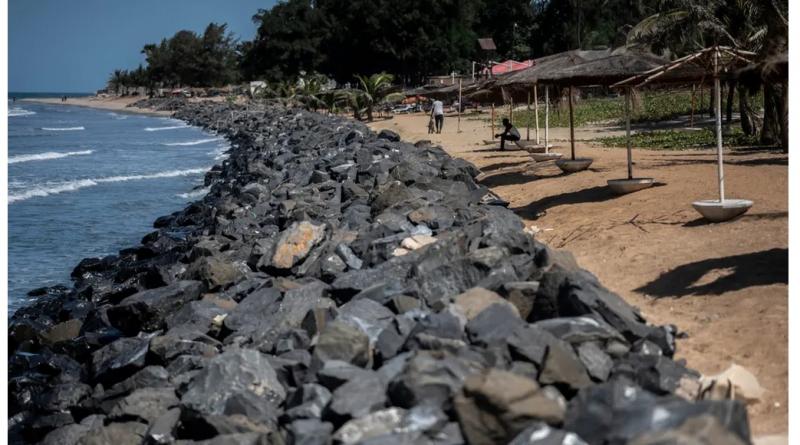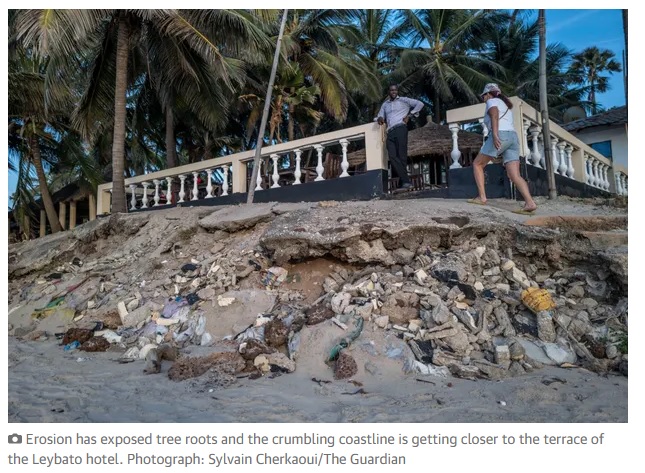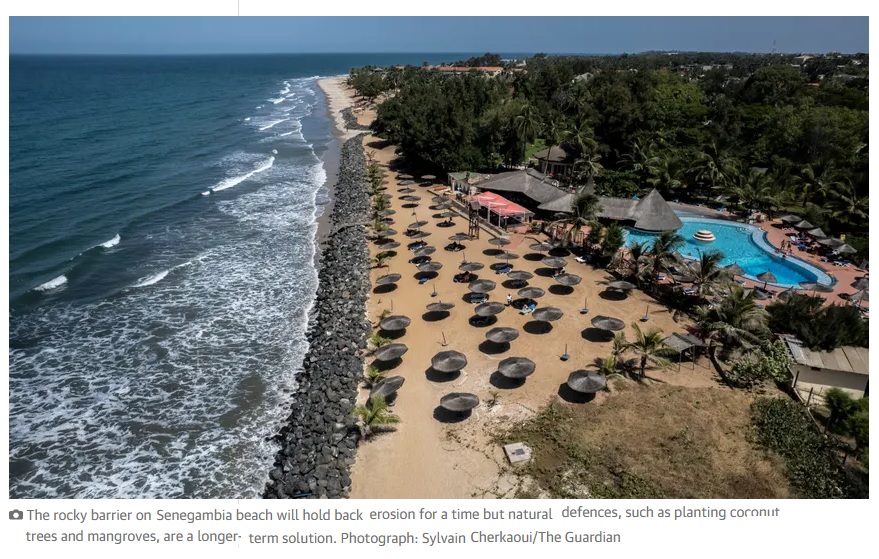Can the Gambia turn the tide to save its shrinking beaches?

In a developing country reliant on its tourist industry, the rapidly eroding ‘smiling coast’ shows the urgent need for action on climate change
When Saikou Demba was a young man starting out in the hospitality business, he opened a little hotel on the Gambian coast called the Leybato and ran a beach bar on the wide expanse of golden sand. The hotel is still there, a relaxed spot where guests can lie in hammocks beneath swaying palm trees and stroll along shell-studded pathways. But the beach bar is not. At high tide, Demba reckons it would be about five or six metres into the sea.
“The first year the tide came in high but it was OK,” he says. “The second year, the tide came in high but it was OK. The third year, I came down one day and it [the bar] wasn’t there: half of it went into the sea.”
That was in the 1980s, before most people had even heard of the greenhouse effect.
But to Demba, 71, and many others like him, it was obvious even then that things were changing. The sea was coming in further and further every year, and the coastline, bit by bit, was crumbling.
Now, the Leybato has lost not only its beach bar but, at high tide, its beach: the sea comes right up to the bottom of the terrace and splashes over the top. The erosion of the coastline is clearly visible in the cracked paving stones and exposed roots of the coconut trees. The sea grass that used to carpet the ocean floor has gone.
“Those grasses were protecting the sea, but there are no more now,” says Demba. “I also used to see turtles, big turtles. Now, none. We are in a very sad situation.”
All along the 50-mile coastline of the Gambia, Africa’s smallest mainland country, hotels and guesthouses are facing similar pressures. And, in a developing country where tourism makes up about 20% of GDP and employs tens of thousands of people, it could not be more important that they withstand them.
“We have already learned the lesson from Covid-19. Tourism is very, very important [for the country],” says Alpha Saine, front-office manager of the Kairaba hotel, one of the two most luxurious in the country.
After a prolonged absence during the pandemic, European tourists are starting to return to the Gambia, even if numbers appear significantly down. Saine hopes Covid soon “becomes history”.

The threat posed to the industry by the climate crisis, however, is more formidable in the long term, and no one appears to have found a solution that works for all.
On the beaches of the Kairaba and Senegambia hotels, the beating heart of the Gambia’s “smiling coast” tourism industry, a barrier of rocks has been laid that runs for several hundred metres along the shoreline, stopping the waves from encroaching too far. When the tide is low the beach is still big and, in the age of Covid, gloriously empty – but at high tide it is a narrow strip of sand.
That is not enough to put most people off. Taking a stroll in the sunshine with the waves lapping around her feet, Ann Eady – on her 15th Gambian holiday – says the barrier doesn’t bother her at all. “They’ve got to maintain the beauty they’ve got. It would be a shame for it to go,” says Eady, from Dewsbury, West Yorkshire.
The rocks are effective, but Lamin Komma, head of coastal and marine environment at the Gambia’s National Environment Agency, is clear about the project’s limitations. “You cannot protect the entire coast with rocks. You cannot do that,” he says.
Komma, who is developing a coastal management plan for the Ministry of Environment, Climate Change and Natural Resources, wants the country to focus more on boosting its natural defences, for example, planting coconut trees and mangroves, which can help keep sand in place and absorb carbon in the process.

“Putting [in] hard structures, yes, it’s fine, but it’s very expensive and it only serves maybe a period of time,” Komma says. The other thing that needs to change is the country’s expectation that donor partners will foot the bill, he adds. “We cannot keep on relying on donors. We have to have mechanisms in place,” he says.
Over at the Leybato, where Demba breaks off from an afternoon feast of watermelon to talk to the Guardian, he seems in tune with this mindset. Not for him the rock barriers, or sea walls. “I have my plan: planting coconut trees,” he says. He has already planted dozens, and there are more to come.
But although hopeful and ambitious, Demba is also angry that for more than three decades he has been seeing the climate crisis coming and nothing has been done to stop it.
“I don’t think they’re listening to us,” he says, standing beside his crumbling terrace, referring to the political leaders meeting last week at Cop26.
“That woman, from Sweden I think [Greta Thunberg], they have to listen to the message she is giving the world: not for us now – I’m 71 – but the young people. Climate change is real. The floods, the fire, they are real. But we have no power to do anything about them. We are the victims, we in Africa, and we are powerless. We just want our children to have a future.”
-
Additional reporting by Omar Wally
Lizzy Davies in Fajara







